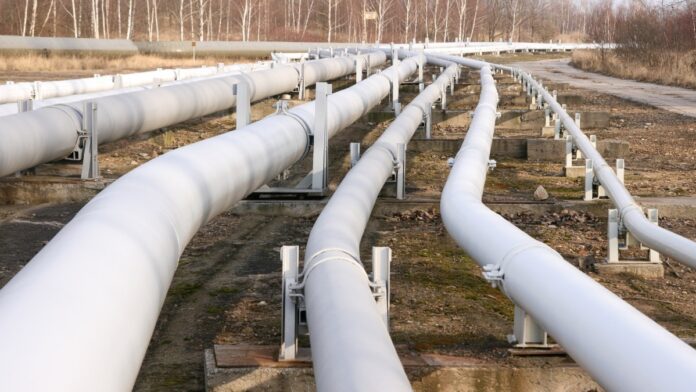A Sunoco pipeline in Bucks County, Pennsylvania, is back in operation despite concerns from residents and local officials following a jet fuel leak that contaminated private water wells.
The pipeline, operated by Energy Transfer, was shut down in January after multiple reports of gasoline odors and tastes in household water.
Sunoco confirmed the leak on January 31 and replaced a damaged section of the 69-year-old pipeline.
By February 2, the line was operational again, raising questions from affected residents and elected officials.
Roughly 100 residents, officials, and company representatives gathered at Sol Feinstone Elementary School in Newtown for a community meeting to discuss the ongoing issues.
Many attendees questioned why Sunoco restarted operations before completing a full investigation.
Officials at various levels, including Upper Makefield Township supervisors, state Rep. Perry Warren, state Sen. Steve Santarsiero, and U.S. Rep. Brian Fitzpatrick, have called for the pipeline to be shut down until a comprehensive investigation is completed.
Residents have expressed frustration over inconsistent well-testing methods, with at least ten attendees indicating that inspectors had not checked for petroleum floating on the surface of their wells.
This inconsistency has led to concerns about the accuracy of negative test results reported by Sunoco.
So far, Sunoco has confirmed that at least six private wells were contaminated with jet fuel and has committed to testing over 200 additional wells in the area.
Energy Transfer representatives have stated they are still investigating the cause of the 2.5-inch crack in the pipeline, which developed from a dent covered with a repair sleeve in 1995.
Although the company conducted excavation work near the leak site in 2023, the leak was ultimately identified using 1990s repair records rather than the company’s leak detection systems.
Federal regulators at the Pipeline and Hazardous Materials Safety Administration (PHMSA) noted that Sunoco had failed to identify the leak for at least 16 months despite multiple resident complaints beginning in September 2023.
PHMSA has since ordered Sunoco to operate the pipeline at 80% of normal pressure, review the integrity of similar repair sleeves, and enhance its leak detection systems.
PHMSA’s February 13 letter to Energy Transfer highlighted concerns that at least 44 other repair sleeves on the pipeline may be at risk of failure.
Sunoco has excavated six similar repair sites in the Newtown area but has reported no additional leaks.
However, the company has not determined how long the leak persisted or how much fuel has entered the surrounding soil and groundwater.
Pennsylvania Department of Health toxicologist Julie Miller acknowledged the lack of comprehensive data on the long-term health effects of jet fuel exposure but noted that individual components, such as benzene, are known to cause health issues.
A well-test reviewed by officials showed elevated benzene levels, a chemical linked to anemia, and lowered white blood cell counts.
Residents in at least one affected household have reported symptoms consistent with hydrocarbon exposure.
Additional concerns have arisen over reports that some wells outside the initially designated contamination zone have tested positive for benzene and other chemicals.
Environmental groups such as the Delaware Riverkeeper Network have called for broader testing to determine the full extent of the contamination.
The growing fear of Bucks County pipeline contamination has prompted further scrutiny from regulators and local officials.
Residents were alarmed to learn that Sunoco has offered to purchase at least two properties in Upper Makefield Township, a fact not previously disclosed to township officials.
Environmental advocate Ginny Kerslake pointed to past instances in which Energy Transfer bought and demolished homes affected by Mariner East pipeline construction issues.
Sunoco has faced legal trouble before. In 2022, the company was convicted on criminal charges related to environmental violations during the Mariner East 2 Pipeline construction.
Additionally, PHMSA revealed that Sunoco had failed to report multiple odor complaints from neighborhood homes in 2024, reinforcing doubts about the company’s ability to detect and manage leaks.
Residents and local leaders demand that the pipeline be shut down until a thorough investigation is completed.
Santarsiero has directly challenged PHMSA’s decision to allow continued operation, arguing that the risk to public health is unacceptable.
Community members have organized a task force to push for better accountability, clean water solutions, and compensation for property damage.
While Sunoco has pledged to provide bottled water, pay for well testing, and install home filtration systems in some affected residences, many believe these measures are insufficient without a full remediation plan.
Sunoco has yet to specify when its investigation will conclude, but PHMSA has requested a metallurgic analysis of the damaged pipeline section by late March and a comprehensive review of similar repair sites by mid-May.
Until then, the Sunoco pipeline will remain operational and transport jet fuel and other petroleum products throughout the region.
Nevertheless, many residents are still concerned that more leaks could surface, adding to fears that the pipeline leaked longer and more extensively than initially disclosed.


